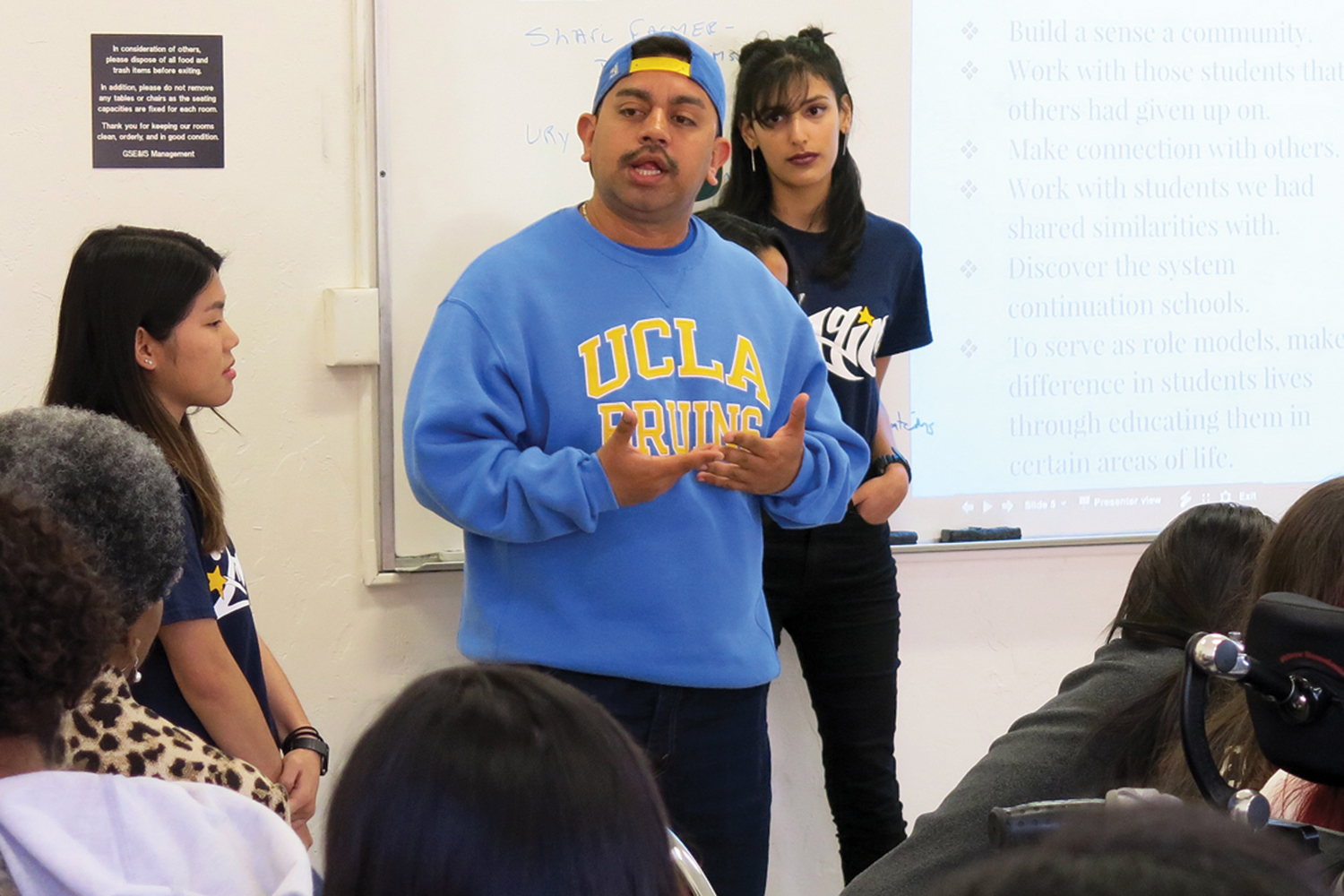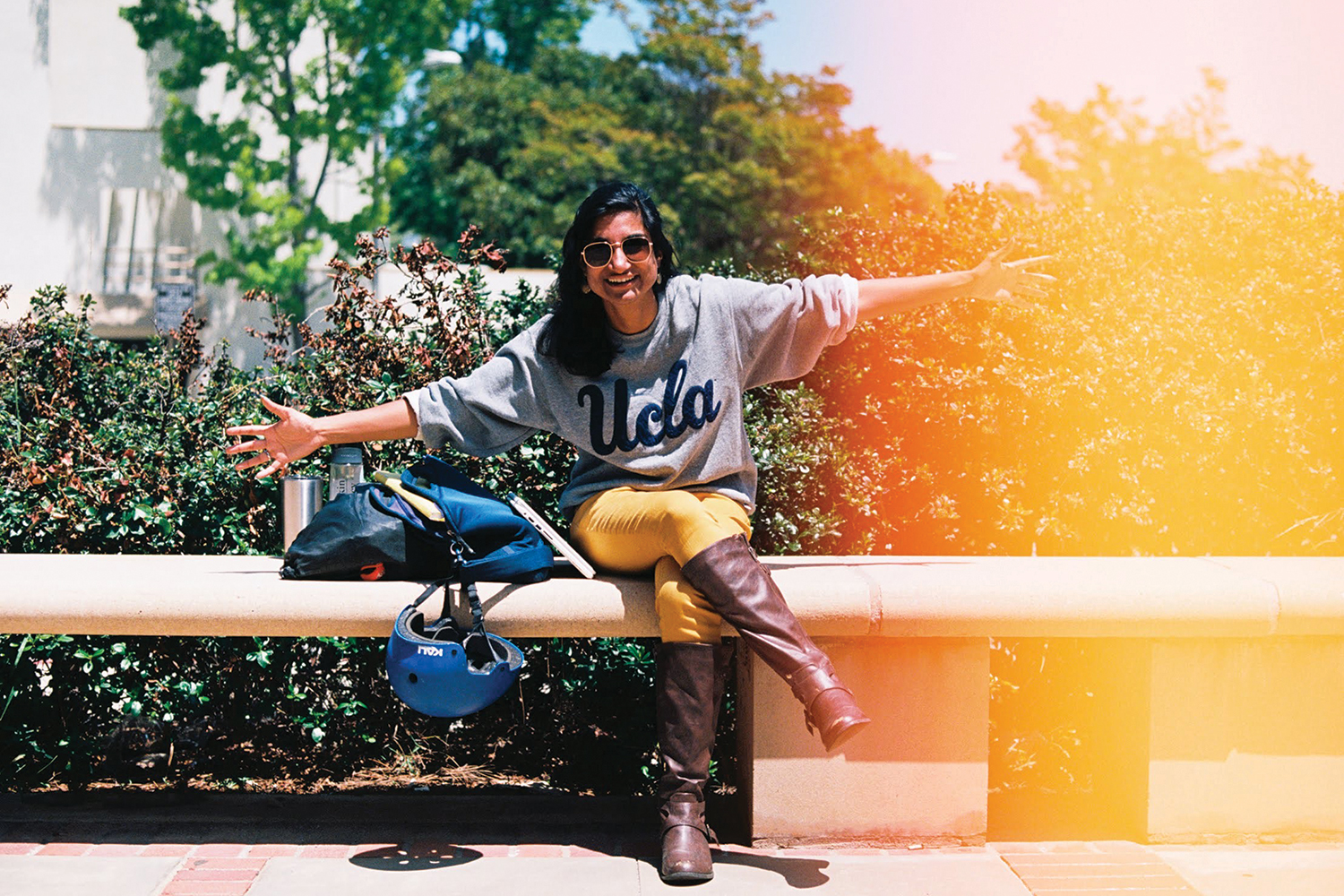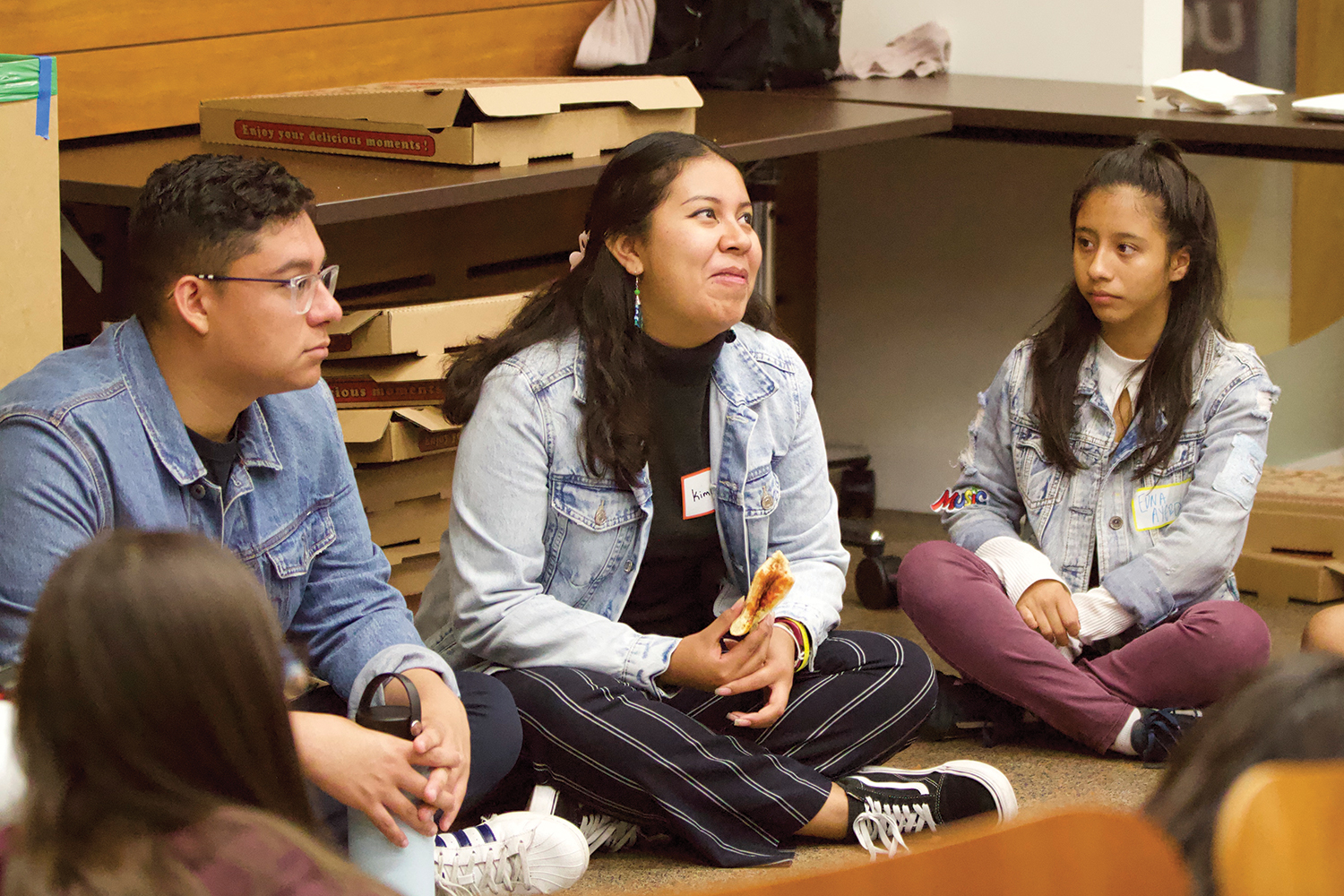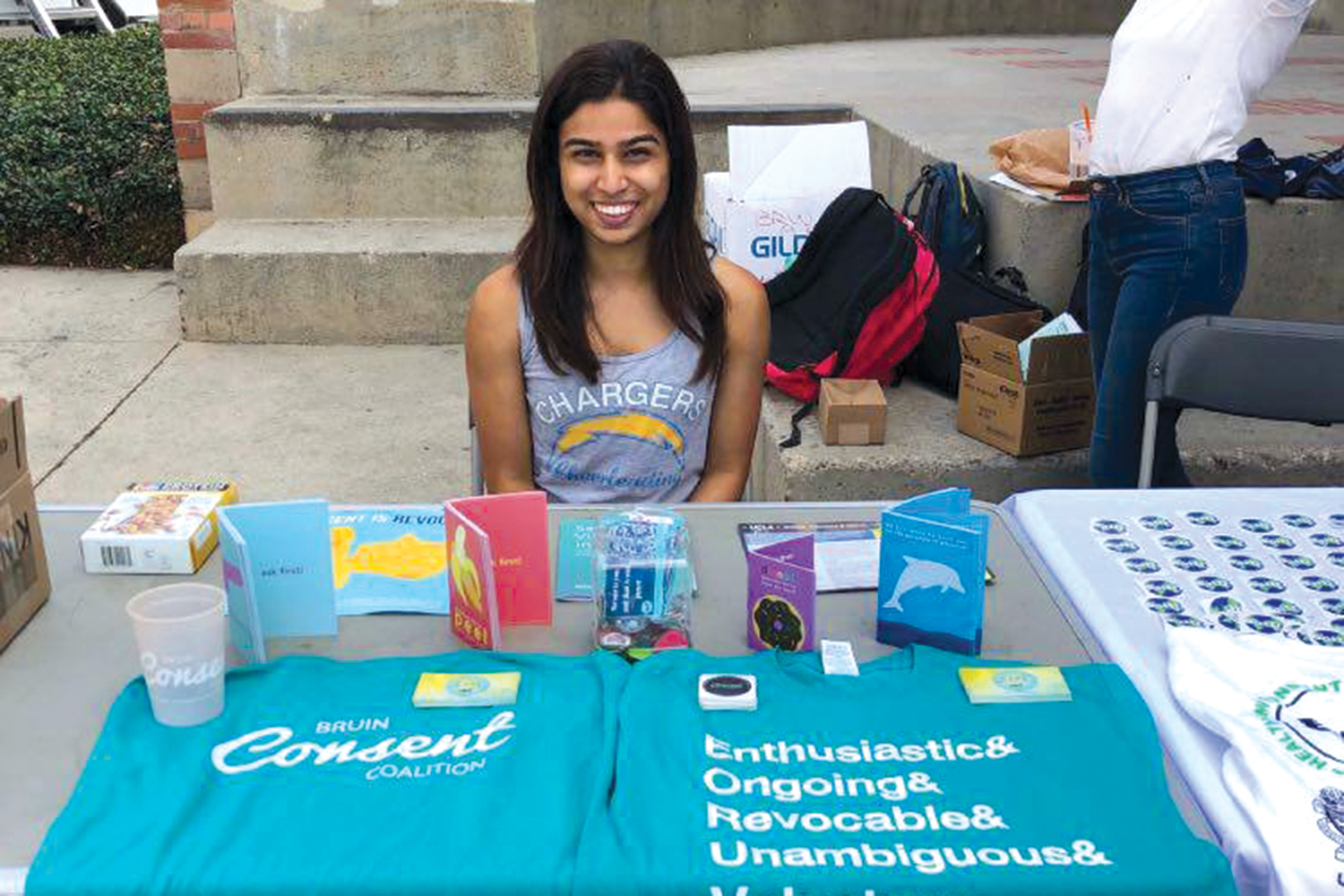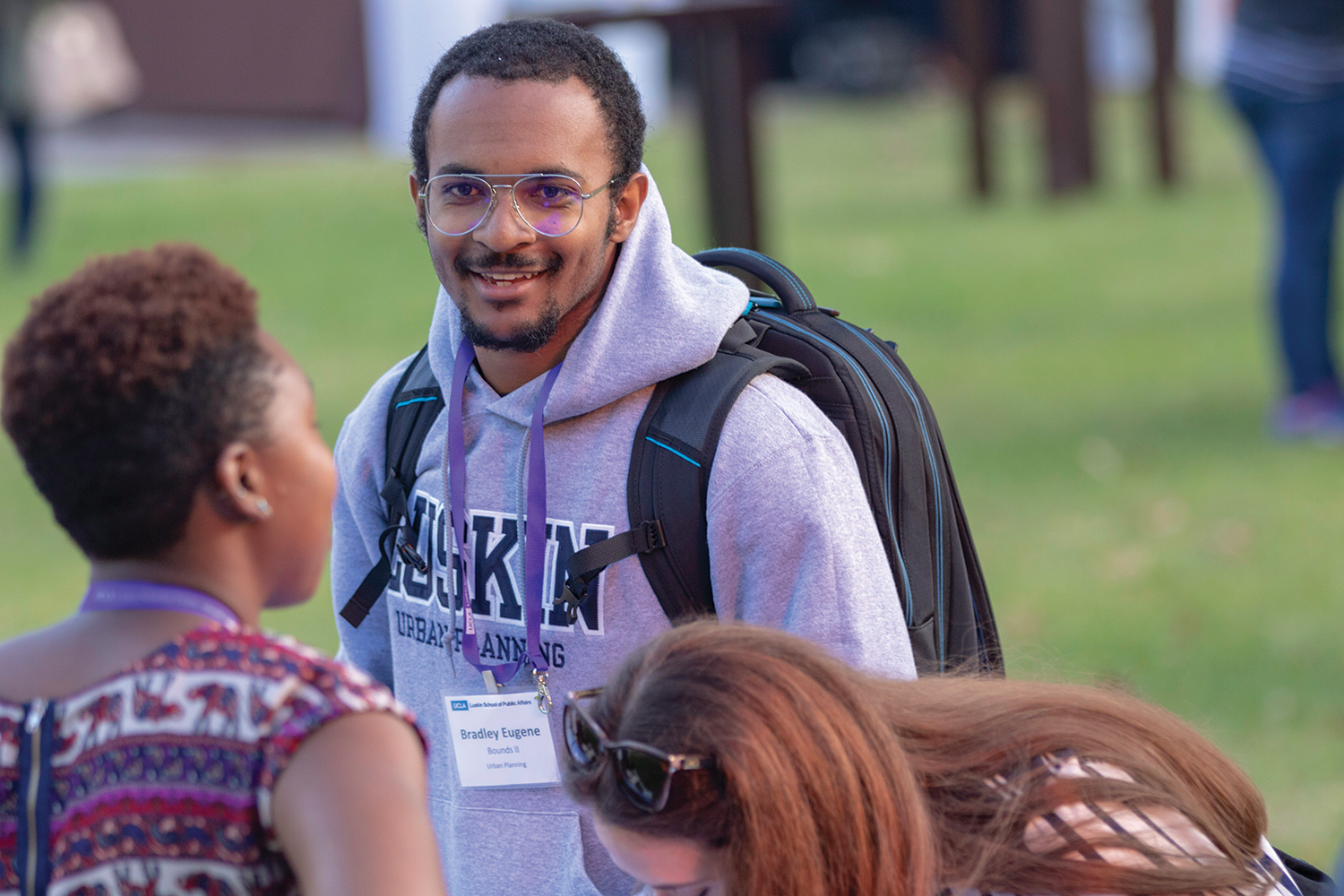Called to Action Many UCLA Luskin students are already making a difference in the world
We can make people’s lives better.
This central idea underlies everything at the Luskin School. In recent months, holding tight to that core philosophy has been of vital importance. This crucial election year began with countless opportunities for political engagement to help redirect our society in a new, more equitable direction. Then came the coronavirus pandemic, threatening our ability to deliver a high-quality education unless we could adapt quickly — and smartly — to the sudden shift to remote learning.
Through it all, UCLA Luskin has persevered. What is the most essential element of our continued success? Our people — including our amazing students.
The graduate and undergraduate students of the UCLA Luskin School of Public Affairs are both dreamers and doers, people who see a need, then fill that need.
In the profiles that follow, we introduce you to some of the many UCLA Luskin students who are already making a difference in the world. They are dedicated. They are driven. To them, it’s not just about pursuing an education. It’s a calling — a call to action!
MAKING HIGHER EDUCATION AN ACHIEVABLE GOAL FOR ALL
Sam Haddad wants to make sure California students of all backgrounds know they have a path to college — and the younger the better.
“I think it really starts with getting to them as early as possible and encouraging them to orient themselves in a way where they would want this,” said Haddad, who has worked with many students who had never considered higher education as a realistic goal.
“The world is very small when you’re in middle school, it gets a little bit bigger in high school, and it gets a lot bigger as an undergrad,” the UCLA Luskin public affairs major said. “So you just have to show them that there’s a lot of opportunities beyond what they’ve been accustomed to.”
Haddad is a coordinator for UCLA’s Bruin Ambassadors, a team of undergraduates who connect with prospective students at high schools, college fairs and on-campus events.
“We get kids excited about what it means to be at an institution like UCLA — that it’s possible, and how to afford it. We are their resource throughout the admission process,” he said.
He is also a founding member of the Luskin Undergraduate Students Association (LUSA), which focuses on networking and mobilizing in the community. Last fall, several LUSA members traveled to Kid City, a nonprofit providing leadership development for youth in South Los Angeles, to assist students with their college applications. Working one-on-one, the undergrads helped the students shape their personal essays for the greatest impact.
“These students have really, really rich stories that they may not know how to verbalize yet. It’s hard to structure your narrative when you’re in the middle of making your narrative,” Haddad said. “LUSA helped them put it all into perspective and edit their essays to a level that would make them more competitive.”
Haddad said his eagerness to encourage students to work toward a college education comes from his own experience finding a path to UCLA. He feels a connection with first-generation students, even though his parents were largely educated in Amman, Jordan, before moving to Southern California before he was born.
“It’s a very, very different landscape to be educated in the Middle East than to be educated in the United States,” he
said, noting that his family was not familiar with UCLA or the rest of the California university system.
“The person who really helped me understand that there were opportunities beyond what was around me was my brother,” who shared advice and resources from his excellent high school counselors, he said.
With an interest in politics and policy, Haddad has interned in his congressman’s office and plans to complete an internship through the University of California’s Washington Center. After graduation, he hopes to jointly pursue advanced degrees in law and public policy.
For now, Haddad plans to continue spreading the word, particularly in disadvantaged communities, that hard work during the high school years can put top-rated universities within reach.
“The more students we have coming from these backgrounds, the more they can reach back into their own communities to allow more students to prosper,” he said.
—Mary Braswell
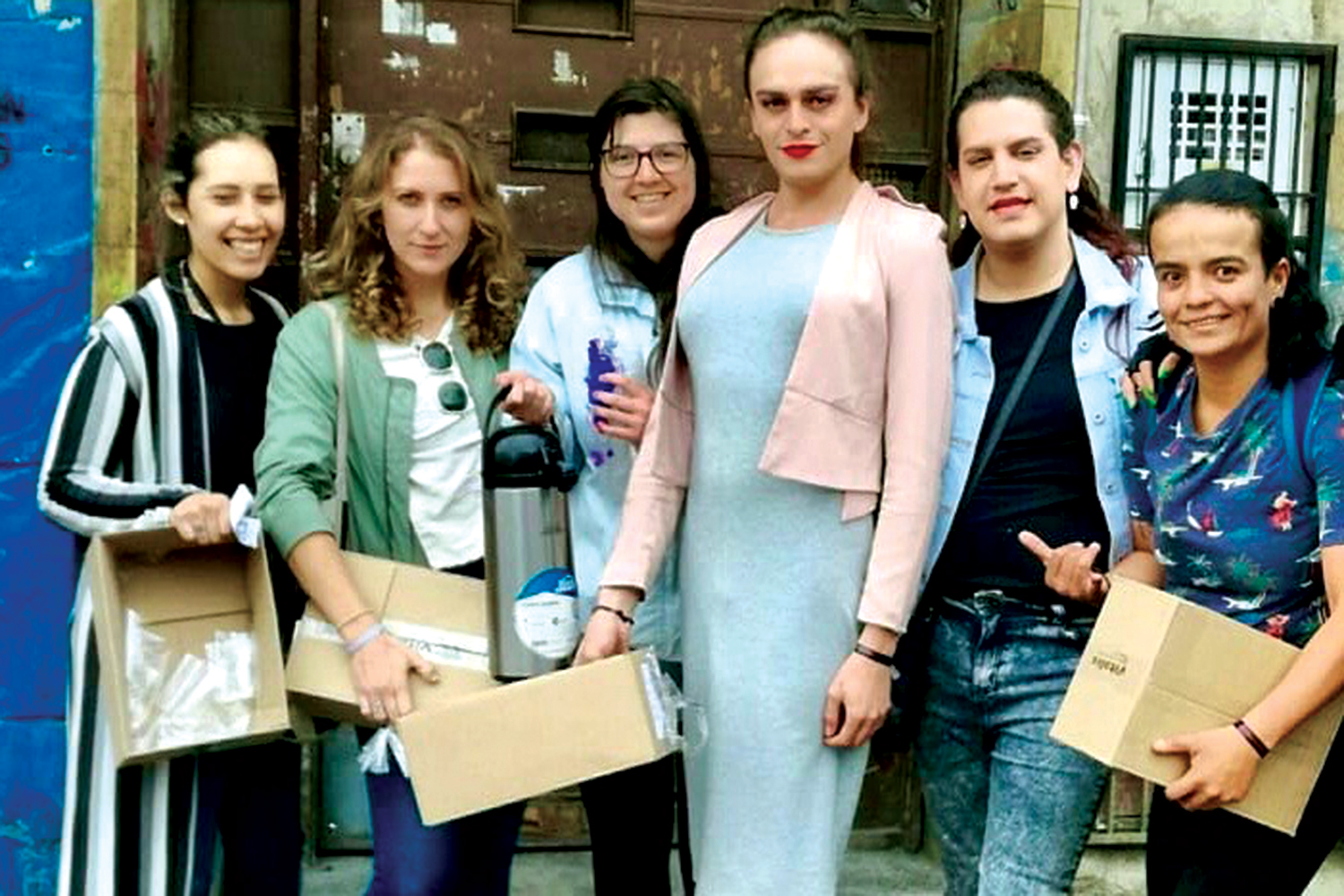
Olivia Miller, second from left, joins a team distributing condoms and coffee in a sex work zone in Bogotá.
EMPOWERING COMMUNITIES ON A GLOBAL SCALE
In 2016, Olivia Miller was living and working in Ecuador when a massive earthquake killed 668 people on the country’s coast. Miller took it as a call to action and headed to the decimated region in hopes of providing support. That decision set her on a path that eventually led to UCLA Luskin and research grounded squarely in community empowerment.
“I started working with this wonderful project called Comparte Ecuador, which means “share Ecuador.” It was this really beautiful sort of grassroots community organization model that worked in what they called community reactivation.”
The idea of Comparte Ecuador is to do more than just provide emergency housing or supplies.
There are lots of Non-Governmental Organizations, or NGOs, on site after a natural disaster. “There’s this flood of NGOs that show up to the scene and donate a bunch of items, like mattresses and food and whatever. And then all of a sudden, they disappear,” Miller explained. “But my organization was really focused on asking, ‘Well, what do people want in this community to be self-sustainable so that they are not forever depending on outside organizations to give them things?’”
Miller’s drive to help others without reinforcing a dependency model led her to seek out like-minded peers and professors at UCLA like Amy Ritterbusch, an assistant professor who shares Miller’s interest in working internationally with communities facing violence. Ritterbusch connected Miller to a group of trans activists in Bogotá, Colombia, who were fighting against state violence. Last summer, Miller conducted field work in Colombia that formed the basis of her capstone project at UCLA Luskin.
Miller acknowledges that she is accountable to her professors and to the realities of academic research, but during her capstone she sought to stay true to her belief in community empowerment.
“How do you solve homelessness when you’re not asking the people who are experiencing homelessness? Who are the experts on homelessness?” she said, then continued with the analogy. “It’s the people who are living in homelessness every day.”
Miller’s goal is to pursue work built around that concept. “It’s about smashing those walls that divide us and that put people in boxes and tell them where they belong and what they can or can’t have as an opinion,” she said.
In her capstone, Miller hoped to “reimagine the relationship between street-based social work support and people facing structural violence in a real way, especially people whose livelihoods are connected to the street. It’s about how we can reimagine that, utilizing best practices of the people who have been figuring this out for themselves for a long time.” The way to solve social problems, Miller thinks, is to listen.
“It’s not about me, coming in from UCLA. I love having these conversations with [the people she met in Latin America] because it is so powerful to listen to them reflect on their movement. At the end of the day, the activists I work with are the ones who are changing their situation.”
—Les Dunseith
SERVING AS A ROLE MODEL FOR THE FORMERLY INCARCERATED
Empower the powerless. Give a voice to the voiceless. Change a life.
For Romen Lopez, such phrases are more than platitudes. They describe his life.
Today, Lopez is a 2020 UCLA Master of Social Welfare recipient, a deeply engaged single father raising three children, and a leader of multiple efforts to direct youths from disadvantaged circumstances toward potentially life-altering educational opportunities.
But a dozen years ago? Romen Lopez was a convicted gang member cycling in and out of prison, seemingly on a path to self-destruction.
“I never in a million years thought I would be doing a master’s at UCLA,” Lopez said of his younger self. “That would have made no sense to me.”
Having followed a path to redemption via higher education, Lopez has seized the opportunity to turn his personal journey into a call to action for others in similar circumstances.
Lopez was part of a team of Social Welfare students who researched the Reintegration Academy at Mt. San Antonio College in Walnut, which points formerly incarcerated youth toward community college educations. Lopez’s similar path began at East L.A. College, then UCLA as an undergraduate
and on to graduate study at UCLA Luskin.
He also founded a UCLA organization called Reforming Education to Diminish Incarceration (REDI), which encourages formerly incarcerated students applying for admission to highlight their experiences in the justice system as “a form of empowerment and not a disability.”
Growing up in East Los Angeles, Lopez said, the best he could imagine was a menial job to pay the bills. His mother urged him to stay in school, but by his freshman year, he had joined a street gang.
When police caught him with a gun, he wound up in the parole-to-prison pipeline, which continued after he aged out of the juvenile system. “I went to prison five times from the age of 19 to my mid-20s,” he recalled.
The turning point for Lopez was Homeboy Industries, founded in 1988 by Father Gregory Boyle to improve the lives of former gang members in East Los Angeles. But it wasn’t a quick fix. Lopez started working at Homeboy in 2009, sweeping sidewalks and cleaning windows, but was arrested on a vandalism charge that sent him back to prison for two more years.
In prison, he earned his high school equivalency degree, and when he was released in 2011, Lopez began remaking his life. A lawyer at Homeboy Industries helped him clear up debts. He completed mandated substance abuse classes. He resolved a DUI to restore his driver’s license. And he began the legal process to obtain visitation rights — and eventually full custody — of his children.
The next step was East L.A. College, where he wound up working for the campus’ student government and, eventually, became student body president.
“I got to experience things I had never experienced before in my life,” said Lopez, including flying on a plane for the first time to attend conferences in places like Texas and New York.
Lopez’s decision to attend UCLA after finishing community college centered around his children, now aged 16, 14 and 8. The university had offered family housing, and “that’s an automatic no-brainer,” Lopez said with a laugh.
“My kids get to live out here in West L.A. now, and they get to see the campus. They know how to navigate higher education,” he said. “That’s something that I never knew.”
As his UCLA Luskin graduation neared, Lopez was both excited and apprehensive. “I’m kind of scared about it because I’ve been in school for the last seven-and-a-half years,” Lopez said. “Now I am going to need to find another spot for me and my kids to live.”
The next step in the remarkable journey of Romen Lopez is not yet certain. But he’s educated now and is eyeing a career in mental health. Plus, he has trusted advisers at Homeboy Industries and UCLA faculty like Jorja Leap in his corner. He’ll figure it out.
After all, the Romen Lopez of today has power, he has a voice, and his life has forever changed.
—Les Dunseith
HARMONIZING TO FOSTER EMPATHY
Building a healthy community requires strong public policies as well as buy-in from the people on the ground. And a little music couldn’t hurt.
That’s the approach Noreen Ahmed is adopting in her post on the North Westwood Neighborhood Council, where she has taken on homelessness, gentrification and other issues important to UCLA and its neighbors.
“Everybody’s paying attention to homelessness right now, but there are these frustrations about the speed of how things are going. I just think there are opportunities to get more creative,” said Ahmed, a freshly minted MPP who was interviewed before the COVID-19 lockdown.
She envisions a musical celebration at Westwood Park, south of campus, where homeless encampments have created a divide among neighbors. By sharing their artistic talents in a common space, she believes students, residents and the unhoused would see one another in a new light.
“A lot of events that happen are a one-way thing — we serve you and we give you these resources. But I think there can be ways to elevate the conversation,” Ahmed said. “I think that the timing is just right to pull all these people together.”
Los Angeles is perfectly situated to bridge policymaking, technology and the arts, she said, adding that the students of UCLA are primed to accelerate change.
“My big goal is figuring out how to harness the UCLA voice. … It’s amazing to see the advocacy that’s happening, especially in the undergraduate community,” said Ahmed, who served on the board of directors of the Associated Students of UCLA, the largest student organization in the country.
On her way to Westwood, Ahmed took a winding path, both geographically and philosophically. Growing up in Maryland, she attended Catholic schools but supported her family’s Muslim faith, especially after 9/11. Her love of music led her to Boston University, where she studied to become an executive in the record industry. But she eventually realized that she was called to a different life.
“I just became a much more grateful person. And I wanted to give back in a way that I personally did not know how to do through the record industry,” she said.
So Ahmed joined the Peace Corps. After a tour in the West African nation of Mali, she spent years working in Baltimore and Denver with nonprofits devoted to community development and educating young adults who had dropped out of high school.
“I was in that social work role, though I didn’t have training and I was kind of learning as I went. That was one of the things that really drove me to get into public policy — just trying to get resources for students and seeing the challenges, hearing their stories and knowing how much was on their shoulders,” she said.
“I realized that I wanted to get myself into a place of power to be able to change some of these things,” Ahmed said. And she was pulled further west to complete that mission.
“UCLA is the only school that I wanted to go to, anywhere. It just felt like it was like the people’s school,” she said. “Diversity was really one of the key things for me. I wanted to go to a school that encourages new voices and different voices, and so that’s what attracted me to this program specifically. And it just intuitively felt right.”
After a life moving from place to place, Ahmed is now an established Angeleno. “This is the first place I’ve ever lived where I know I’m going to be for a long time.”
She has made the most of her time in the city, with internships in the offices of Mayor Eric Garcetti and Councilman Marqueece Harris-Dawson, as well as with the governmental public relations firm Cerrell Associates. She
also spent several months campaigning for an L.A. City Council candidate.
Ahmed plans to serve out her three-year term on the North Westwood Neighborhood Council, working diligently for the community — with tunes, whenever possible.
“I literally have harmonicas in my pocket,” said the lifelong music-lover, who approaches guitarists on campus and on the streets and offers to play accompaniment. “I look at it as part of this vision where there’s something more powerful happening than just playing music. It’s about harmonizing, but in a bigger way.”
—Mary Braswell
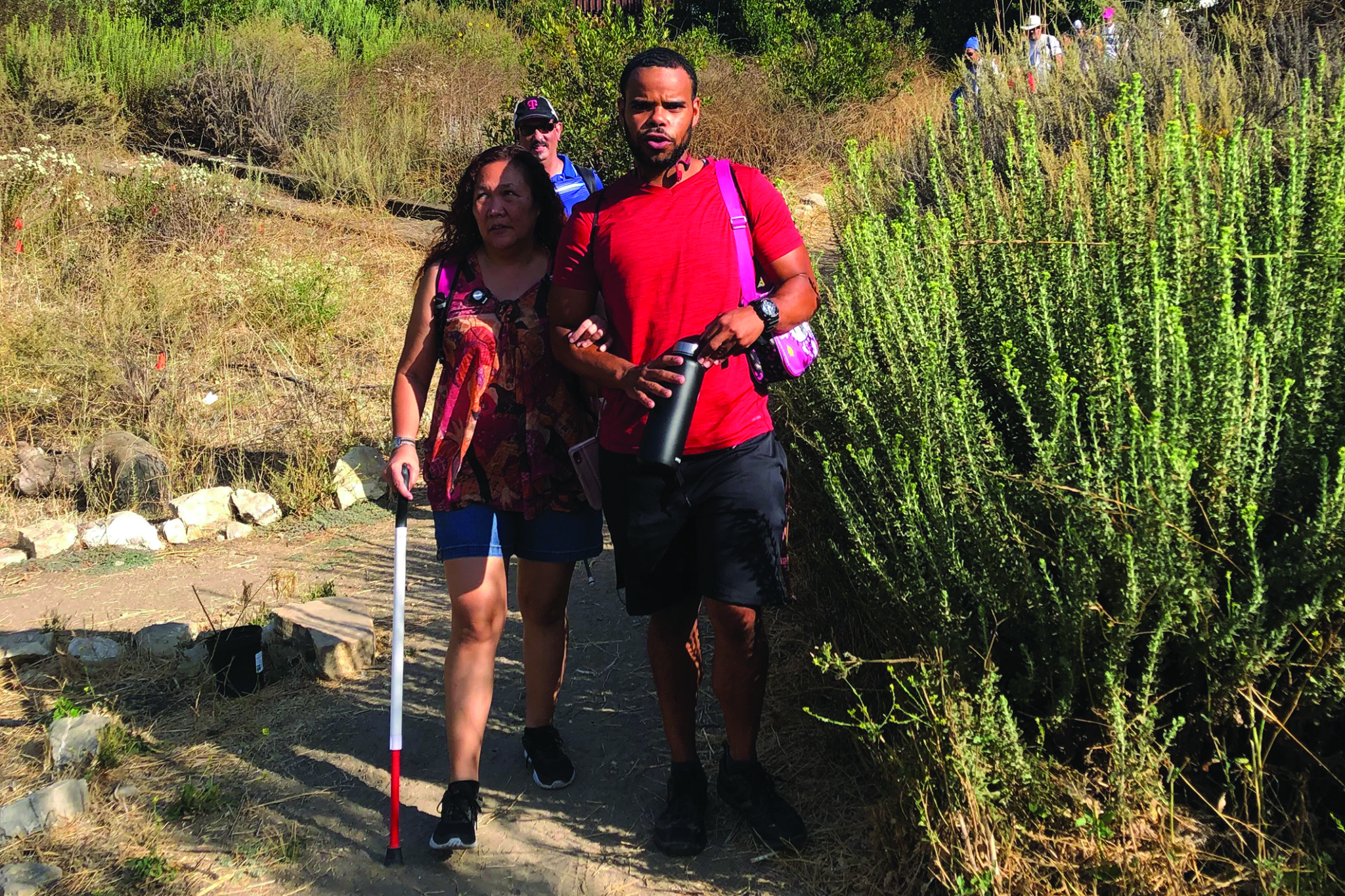
Joseph Burton is the founder of Hearts for Sight Foundation, a nonprofit organization that seeks to break down barriers to health and fitness among the blind and visually impaired.
HELPING THE VISUALLY IMPAIRED GET HEALTHIER
First, Joseph Burton decided that his degenerative visual condition would not prevent him from improving his health. He began exercising more and eating better, and Burton lost weight and his fitness markedly improved. So he took that success as a call to action and began helping others in similar circumstances do the same.
Burton is the founder of Hearts for Sight Foundation, a nonprofit organization that seeks to break down barriers to health and fitness among the blind and visually impaired.
The organization had been ramping up its activities prior to the coronavirus pandemic by offering bike rides, a yoga series and group hikes in cooperation with the Sierra Club. During one of those hikes at Ernest E. Debs Regional Park in late January, the group recorded a promotional video about the experience that can be viewed on YouTube. It shows sighted guides helping blind participants navigate trails as they make their way through scenic locations in the hills northeast of downtown Los Angeles.
“My focus and passion right now is working with people with visual impairments,” Burton said. “I find that they are some of the most vulnerable populations, and people who often get overlooked.”
Burton, who is entering his second year as a master’s student in social welfare at UCLA Luskin, has retinitis pigmentosa, a genetic disorder that impacts vision in low light and reduces his peripheral eyesight. Eventually, he may lose his vision altogether.
Since founding Hearts for Sight in 2016, Burton has been gathering support from others in similar situations — the members of the Advisory Board of Hearts for Sight are all people facing vision challenges. They work together to “eliminate barriers that prevent the blind and other people who are visually impaired from participating in physical activity,” he said. “What we want to do is promote … the full health, wellness, and mental, physical and emotional well-being for our population.”
An eventual goal of Hearts for Sight is the creation of a wellness center with a gym where people with visual impairments can work out without fear of hazards.
“That’s just a huge challenge,” Burton explained. “I have a high degree of vision still. But when I go to a gym, I’m constantly having to navigate slowly, just to make sure that I’m not tripping over somebody’s leftover weights.”
Nutrition counseling is another need.
“A lot of our population, they resort to fast food or canned foods,” said Burton, pointing out that many people with visual impairments find navigating a kitchen particularly difficult. Some don’t use their kitchens at all. “It’s been a goal this year, actually, to find partners who can help us provide workshops so that we can really teach folks how to navigate their kitchen spaces and develop wholesome meals.”
Burton’s interest in social work is connected to his experiences as a foster child while growing up in San Diego. He started Hearts for Sight while an undergraduate student at Cal State Dominguez Hills. Because his career interests relate to nonprofit development to benefit underprivileged populations, he had long dreamed of attending UCLA, an elite university with a strong focus on social justice.
“I am an African American. I’m young. I was a foster youth. Credibility has always been something that I’ve really wanted,” Burton said. “I knew coming here would really be advantageous for me in terms of bridging relationships with the right people who can help me further my organizations’ mission and vision.”
While a full-time student at UCLA, Burton has worked as a case manager for homeless men at Society of St. Vincent DePaul. And he has started laying the foundation for a capstone research project about the barriers to physical activity faced by the visually impaired that he will complete during his second year at UCLA Luskin Social Welfare.
What’s next after the master’s degree?
“I would love to become Dr. Burton,” he said with a broad smile. Earning his Ph.D. would be personally gratifying, of course, but Joseph Burton is someone who believes that accomplishments become more meaningful when they are shared.
“As a former foster youth who’s been a part of social programs my whole entire life, to be on the other side of it and being able to give back to others, that’s something I feel strongly about,” he said.
—Les Dunseith
LIFTING UP HER NEIGHBORS
Neighborhood is important to Kimberly Fabian. So wherever she goes, she makes connections with people who remind her of home.
“I’m from Koreatown, and that place is beautiful,” she said. “I grew up with a lot of immigrants and a lot of low-income people, and it was just the most amazing experience.”
Fabian learned the meaning of community in that richly diverse pocket of Los Angeles, but she also witnessed a deep communications divide.
“The people themselves, they got along really well. … But the community was sort of disconnected from the institutions that were in place there,” she said. Dealing with landlords or school officials did not come easy for many, she said, and “I’ve never known a lot of people who voted.”
Now a fourth-year public affairs major, Fabian has found a multitude of ways to bridge that divide, both on campus and all across the city she loves.
Earlier this year, Fabian spent time in Boyle Heights and South Los Angeles to get out the Latino vote. Joining other UCLA students staffing tables on behalf of the nonprofit Voto Latino, she shared information about strengthening communities through the ballot box.
“Someone told us something really heartfelt. They were saying that Latinx families trust Latinx women the most,” she said. “I like knowing that they’re hearing this information from us, instead of some random city official that they might have no reason to trust.”
Fabian also underwent months of training to become IRS-certified to assist people struggling to fill out their tax returns. She recalled a session at Central Library in downtown Los Angeles, where she helped an older woman who spoke no English and had a disabled husband at home. Other tax services had given the woman bad information or asked for substantial fees, but Fabian was able to guide her through the filing process at no charge.
“She was so happy, she wanted to tip me, and I said, ‘No, no.’ Then she came back that afternoon with a bag of avocados, and I said, ‘OK, I’ll take some avocados,’ ” Fabian said. “There were a lot of things going on with her story and with her life, and I was really happy that I was the one who got to help her.”
At UCLA, Fabian has benefited from the Academic Advancement Program, which provides resources to low-income or underrepresented students. Now, she is one of the program’s paid peer tutors, providing help in microeconomics while building relationships and trust.
The program is “very intentional about wanting to relate to students by using people who come from the students’ same backgrounds,” she said. “Some peers talk about imposter syndrome with me, and it’s like we’re at the No. 1 public institution in the country and it’s super great, but then you’re struggling because microecon can be hard.”
In the coming year, Fabian will complete a senior capstone project for her public affairs B.A. She aims to immerse herself in an inner-city college access program for kids to study which factors lead to success. She has also worked with data that guide policies for education reform as an intern with the Los Angeles Education Research Institute, co-founded by Associate Professor Meredith Phillips of UCLA Luskin Public Policy. And she hopes to one day pursue a graduate degree in sociology so she can continue to lift up communities like the one where she was raised.
“Every time I’m helping these people, even if I don’t know them, it feels like I’m helping my neighbor, it feels like I’m helping someone I grew up with,” Fabian said.
—Mary Braswell
CRUNCHING NUMBERS TO BENEFIT MARGINALIZED COMMUNITIES
When Michael Rios first arrived at UCLA to pursue his Master of Public Policy, he was intrigued by a course that had just launched in the fall of 2018.
“Voting Rights Policy and Law” promised to take graduate students on a yearlong journey, from theory and methodology to a real-world court challenge at a place where the right to vote was under threat.
“The most attractive thing about it was the fact that it was so hands-on,” Rios said of the course, taught by Matt Barreto, professor of political science and Chicano/a studies, and civil rights lawyer Chad Dunn.
“They had made it known that, at the end of the year, they wanted to open up several lawsuits against certain jurisdictions — and that it would all be from our work,” Rios said.
“You come to Luskin, in general, to help people and give back to marginalized communities, and this was a major way to do it.”
By year’s end, Rios had studied case law, learned to crunch population data, helped shine a light on balloting irregularities in Washington state — then realized he was not ready to give up the voting rights fight.
Fortunately, that first innovative public policy course was blossoming into a new advocacy group, the UCLA Voting Rights Project housed at the Latino Policy and Politics Initiative based at UCLA Luskin, and Barreto and Dunn brought Rios aboard as a policy fellow.
“The objective is to figure out where voters are being marginalized. And if people aren’t allowed the right to have their voices heard, then how do we hold the official mechanisms of government accountable?” said Rios, who also researched and co-authored a memo, at the peak of the COVID-19 pandemic, on the health protections afforded by vote-by-mail balloting.
Rios has a particular affinity for mapping tools and quantitative analysis. “Through the Voting Rights Project, I’ve really been inspired to work with data,” particularly to benefit people, he said.
He has spent hours poring over heat maps and complex columns of data in an attempt to identify places where elected officials look markedly different from their constituents. That’s a sign that voting rights may be diluted or denied.
The research tools Rios has mastered have also been put to use in his Applied Policy Project, the capstone of the UCLA Luskin MPP program. Rios’ team is working for the city and county of Honolulu, which is considering a vacancy tax or some other policy to reduce the number of housing units that stand empty.
“I’ve been collecting 10 years’ worth of American Community Survey data on everything from why units are vacant to people’s education rates to who lives where, and parsing through all that to figure out the best policy option for them,” he said.
With accessibility to information and education one of his top priorities, Rios also initiated a partnership between UCLA Luskin and the Congressional Hispanic Caucus Institute, a nonprofit aimed at cultivating young Latino leaders. Because of Rios’ efforts, beginning this fall, the institute will provide a stipend to graduates of its fellowship program if they choose to pursue a master’s degree at the Luskin School.
For his own educational path, Rios is considering a doctoral program that melds policy and quantitative methodology, with the aim of making data-driven research accessible to a wider public.
“It’s a certain type of skill for someone to be able to look at these huge data sets and figure out what’s the most strategic approach, then interpret the results and put them in layman’s terms so anyone could understand it,” he said.
“So that’s the attractive side of it: How do we ask important questions, and how do we use the data that’s available to us to figure those things out, and how do we tell it to ordinary people?”
—Mary Braswell
ADVOCATING FOR SURVIVORS OF SEXUAL ABUSE
In the fall of 2017, the #MeToo movement was gaining steam, with more women opening up about experiencing harassment and assault.
At the same time, Atreyi Mitra arrived at UCLA, and her ongoing support for gender equity took an urgent and personal turn. Hearing story after painful story about classmates who had survived sexual abuse, she felt she had to act.
“That’s when I first joined Bruin Consent Coalition,” a student-led group formed to support survivors and educate the community, said Mitra, a double-major in public affairs and human biology and society. “And in joining that space, I
saw so many people that I had formed such close connections with who were so very impacted by these issues.”
As she began to grasp the scope of the problem, she also learned a hard truth: While all University of California schools had created Campus Assault Resources & Education (CARE) offices to provide support, healing and advocacy, “they are understaffed, under-resourced and underfunded,” Mitra said.
So she began to dig for data to make the case that survivors and survivor advocates deserve more support.
Mitra collected data from CARE offices across the system, as well as documents from the UC Office of the President. She interviewed CARE staffers and activists against sexual violence, and conducted student surveys to gauge the campus climate. With this foundation, she began to build a case for additional resources.
One example: In 2017-2018, UCLA’s CARE office handled 770 cases with just two advocates. The Chancellor’s office has since funded two additional advocates, and the UC Office of the President has launched a systemwide assessment of CARE resources.
Spending time in different arenas of activism — front-line survivor support and behind-the-scenes data-mining — Mitra also discovered insights about her own strengths and limitations as an advocate.
“As I got more involved, I could feel myself becoming emotionally exhausted. I found that I no longer had an off switch,” she said. With grassroots organizing taking a toll on schoolwork, as well as her own well-being, she decided to step back from the Bruin Consent Coalition and funnel her energy into research.
“I have to say that that entire shift was not something that came easily,” she said. “It came out of a lot of pain, but I think it was better for me.”
Mitra is now pursuing an independent project through UC Speaks Up, a network of public health researchers from UCLA, UC San Diego and UC Santa Barbara, all working to combat sexual violence on campuses.
Her goal is to identify barriers to accessing the UC’s CARE resources. Her research has shown they include straightforward factors such as office hours and location, but also more nuanced concerns such as fears that confidentiality will be breached or seeing few people of color on staff.
Mitra also serves as a student representative on the UC Committee on Research Policy, which advises the UC president on research matters and coordinates policies and procedures across all campuses. And she makes her voice heard as part of UCLA’s Student Fee Advisory Committee, which guides decisions about the allocation of funds on campus.
“I think none of us like to admit this, but money is power. If you truly want to support change, a lot of that support at the end of the day comes fiscally,” she said.
After graduation, Mitra aspires to work at the intersection of research, policy and advocacy, possibly in law, education or nonprofit work.
“I now know that I’ve always preferred to work through academia and bureaucratic structures to create the kinds of changes I want to see,” she said.
—Mary Braswell
PLANNING FOR SOMETHING BIGGER THAN HIMSELF
As a newly admitted graduate student in 2018, Bradley Bounds II said he wanted to make a local impact.
“I want to work on building up my community,” said the Compton resident, who was already working as a planning intern for Long Beach when he came to UCLA Luskin.
Two years later, he’s doing just that. Juggling a demanding school and work schedule, Bounds completed his Master of Urban and Regional Planning degree in cooperation with classmates who developed aspects of a new General Plan for Culver City — one that will impact the city’s built environment and the lives of its residents for decades to come.
Bounds’ participation in the project was part of a comprehensive capstone course led by Paavo Monkkonen, associate professor of urban planning and public policy.
“It’s rare that the General Plan would be updated all at the same time,” Monkkonen explained. “What happens usually in planning is certain parts of it are updated periodically and, in Culver City’s case, some parts have not been updated since 1962.”
The city was originally incorporated in 1917, only a year after the enactment of the nation’s first zoning ordinance.
“There’s a lot of parts that haven’t been modified, so it’s been a big deal,” Monkkonen said. Unlike past councils, the governing body in Culver City today is much more progressive.
Monkkonen said the idea to engage with UCLA Luskin on the client project came from alumnus and Culver City council member Daniel Lee MSW ’15, who was elected in 2018 and is the first African American ever to serve there.
Bounds was part of a 15-student class that worked in six subgroups. They connected with city leaders and staff, developers and other stakeholders on such topics as transportation, housing, urban design, environmental impacts and community development.
A city and its consultants must work within certain constraints, but students, who are exploring various concentrations within urban planning, can be bolder and support things that city officials find interesting but don’t have time to study in detail themselves.
“I’m amazed they are attempting to do it,” said Bounds about Culver City officials. “If they succeed, it’s going to be amazing. Whether anyone likes it or not, I’m proud of Culver City for even attempting it and making headway on it.”
Bounds and his subgroup tackled public participation and engagement, a tough task already that became even more challenging amid the COVID-19 pandemic.
“Interviews over the phone are OK, but it’s way better to interview in person,” Bounds said during an interview that took place while the county was under stay-at-home restrictions. “Now we’re trying to figure out how we can get people to actually respond to us and participate in interviews.”
Just before the lockdown, Bounds and his classmates had taken their proposals to the Culver City Council for a public presentation. They asked questions that focused on barriers to greater participation by various constituencies within the city. They also wanted to know how the city planned to become more inclusive.
“We’ve met with different planning departments, and we’ve interviewed stakeholders and some developers,” Bounds said. “Projects that do well are those that get a lot of stakeholder feedback. We have to make magic happen.”
Bounds emphasized that figuring out how to engage different constituencies now is more important than ever, “because now you don’t have the benefit of being able to go by complete word-of-mouth.”
As graduation neared, Bounds was hoping to find a full-time planning job close to home.
“I’ve always wanted to work in government because I’ve always felt myself called to participate in something bigger than myself,” he said. “I’ve always wanted to do something where I was a public servant.”
Perhaps he can even become a planning commissioner for Compton, his hometown.
Bounds hopes to extend progressive planning ideas beyond Los Angeles and toward Long Beach, Compton and other underserved areas. “That’s my dream,” he said. “Maybe I can come back and push for that.”
— Stan Paul

